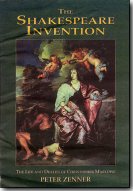Review of ‘The Shakespeare Invention’, by Peter ZennerThis review is by Julie Bunting, and was published originally in The Peak Advertiser, the Peak District's local free newspaper, on 12th August 2002, and is reproduced with Julie's kind permission.
Of all the 50 to 60 names put forward as writing under the name of Shakespeare, that of Christopher Marlowe has had the greatest support. Through painstaking research which has taken him onwards beyond suppositions and scenarios, Peter Zenner is 100% convinced that the famous 'Shakespeare' was in fact Marlowe. The real William Shakespeare of Stratford lent his name to the fraud and a third man let himself be known as William Shakespeare the actor. Says Zenner: 'Shakespeare of Stratford was not an actor, as well as being not a playwright'. The sub-title of The Shakespeare Invention is The Life and Deaths of Christopher Marlowe, for 'Shakespeare's' plays and sonnets continued to appear long after Marlowe was supposedly killed in a brawl. What with the mystery over Marlowe's last resting place and Zenner's discovery of human remains buried in a box of lime, not to mention the deliberate 'doctoring' of William Shakespeare's monument at Stratford, nobody should doubt the existence of a conspiracy theory. Zenner has Ben Jonson down as a murderer and he calls the painter Van Dyck as a witness to the whole conspiracy as he reveals the dark secrets hidden on the very front cover of the book. The story reaches into the Peak where it concerns members of the Manners family, owners of Haddon Hall. One school of thought has it that Roger Manners was the true author of the Shakespeare works. And the Fair Man of the Sonnets was no less than Edward Stanley, the son of Margaret Vernon, co-heiress of Sir George Vernon. The love story of Margaret's younger sister, Dorothy - whose elopement from Haddon has gone down in legend - has strong similarities to Shakespeare's 'Romeo and Juliet'. Lady Grace Manners, daughter of Dorothy, also features in the tangled lives of Edward Stanley and Christopher Marlowe. This is a book to confound the sceptics. A concise chronological summary and family trees enable the reader to make quick recaps, and the author maintains to the end his zest for solving 'the greatest hoax that this country has ever known'. Review by Julie Bunting |
|||
